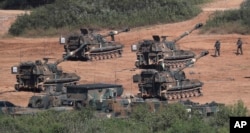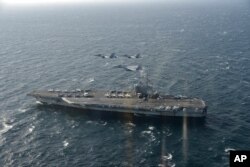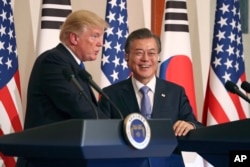Tensions on the Korean peninsula could bet set to once again spike as reports say Pyongyang could be preparing another missile test ahead of joint United States and South Korea military drills.
Reports in South Korea and Japan say radar and radio signals indicate Pyongyang may be preparing another missile test.
At a Tuesday briefing, South Korean Foreign Ministry spokesman Noh Kyu-duk declined to confirm any imminent test, but he said they were watching carefully.
"Under close cooperation with our allies, such as the U.S. and Japan, our government is paying attention to the possibility of North Korea's additional provocation and maintaining a thorough readiness posture," said Noh.
The reports come as the U.S. and South Korea are preparing a five-day joint exercise called “Vigilant Ace” from December 4-8 with thousands of military personnel and more than 230 aircraft, including six F-22 Raptor fighter jets deployed to South Korea for the first time.
Pyongyang routinely condemns such military drills using belligerent language and military threats.
Russia urges “restraint”
Russia’s envoy for the stand-off over North Korea’s nuclear and missile programs says the joint U.S.-South Korea drills were preventing Pyongyang from engaging in direct talks.
Speaking at the opening of a regional conference in Seoul Monday, Russian Deputy Foreign Minister Igor Morgulov said North Korea’s “restraint” in not engaging in nuclear and missile testing since September could have already lead to dialogue.
"If Pyongyang’s demonstrated restraint over the past two months was met with similar reciprocal steps on behalf of the United States and its allies then we could have moved to the start of direct talks between the United States and North Korea," Morgulov said according to a translation of his comments by Russia’s TASS news agency.
Morgulov noted the U.S. and South Korea were well within their rights under international law to hold military drills, whereas Pyongyang’s nuclear development was in violation of United Nations Security Council resolutions.
“However, the nuclear testing and joint military drills both have a negative impact on the current situation surrounding the Korean peninsula, without doubt,” said Morgulov.
The U.S. and South Korea say it is not clear why North Korea has refrained from provocations such as nuclear and missile testing, but they hope it will continue.
Carrot or stick?
The Russian envoy repeated Moscow’s support for North Korea to suspend its nuclear program, as part of a China-proposed “freeze for freeze” deal, in exchange for a halt to large-scale military drills by the U.S. and South Korea.
Washington and Seoul have dismissed a simultaneous suspension, saying Pyongyang must first show it is serious about negotiations by pausing its nuclear program.
Those in favor of limiting joint drills to try to re-start talks argue that military conflict is less likely if there is dialogue. While those opposed say talks for the sake of talks only serves Pyongyang, whose leaders have shown it cannot be trusted.
Despite Russia’s support for United Nations sanctions against Pyongyang, Morgulov argued increasing pressure and sanctions would only encourage North Korea to behave in a confrontational manner while ordinary North Koreans would suffer. But, he acknowledged to Yonhap that Russia would comply with Security Council resolutions not to allow new North Korean workers into Russia.
"We should abandon this practice. So definitely we will do it...as exactly as the resolutions require," Morgulov told Yonhap.
North Korea sends tens of thousands of workers overseas, mainly to China and Russia, to earn foreign currency for the government.
Morgulov later met with South Korea’s top envoy on the North Korean nuclear issue, Lee Do-hoon, and the two agreed to make efforts to maintain peace on the Korean peninsula and encourage dialogue with Pyongyang.
"I think this meeting is very timely, taking place at a time like today when the North Korean nuclear and missile problems are becoming increasingly serious," Yonhap quoted Lee as saying.
Despite frictions, the chairperson of South Korea’s Presidential Committee on Northern Economic Cooperation, Young-gil Song, said Monday the upcoming February Winter Olympics could provide some incentive for maintaining peace on the peninsula.
“President Moon (Jae-in) wants to turn this Pyeongchang Winter Olympics into an Olympics for peace,” said Song. “He has a strong commitment to that end. We should leverage this opportunity to make sure that additional military tension does not escalate on the Korean peninsula.”
North Korea has been invited to participate in the games but has not yet confirmed if it will be sending a team to compete in South Korea.
Diplomatic flurry
South Korean envoy Lee departs Tuesday for the U.S. where he will hold talks with the U.S. envoy for North Korea, Joseph Yun.
The trip follows a series of efforts by envoys from the five nations that have engaged Pyongyang on its nuclear programs - China, Japan, Russia, South Korea, and the United States.
Chinese envoy Song Tao this month made the first trip to North Korea by Beijing’s top negotiator in two years.
North Korea in 2005 agreed to suspend its nuclear program in return for diplomatic and energy incentives. But efforts to end Pyongyang’s nuclear ambitions fell apart in 2008 after it refused inspections and pulled out of the deal.







